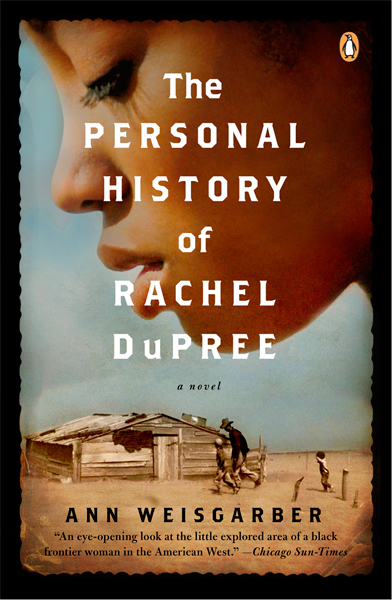The Truth Behind The Personal History of Rachel DuPree
 The Personal History of Rachel DuPree is fiction, and the main characters, Rachel and Isaac DuPree, were not based on actual people. Some of the minor characters, though, were actual people. Readers might be familiar with Abraham Lincoln, president of the northern states during America’s Civil War. But what about Ida B. Wells-Barnett? Was she a figment of my imagination? And Booker T. Washington and Paul Laurence Dunbar? Did I make them up or did they once really exist?
The Personal History of Rachel DuPree is fiction, and the main characters, Rachel and Isaac DuPree, were not based on actual people. Some of the minor characters, though, were actual people. Readers might be familiar with Abraham Lincoln, president of the northern states during America’s Civil War. But what about Ida B. Wells-Barnett? Was she a figment of my imagination? And Booker T. Washington and Paul Laurence Dunbar? Did I make them up or did they once really exist?
Ida B. Wells-Barnett
Ida B. Wells-Barnett, the outspoken newspaper woman who made an appearance in Chapter Nine, was a historical person. She was born in Mississippi toward the end of the Civil War. I had never heard of her when I happened to come across her while researching Chicago’s slaughterhouses. I admired her courage for speaking out against the practice of lynching black people and knew that somehow I had to make her a part of Rachel’s story.
Luck was on my side. Rachel and Wells-Barnett lived in Chicago at the same time. I figured it was logical to suppose that Rachel and her family read Wells-Barnett’s columns in The Conservator, the newspaper favored by Chicago’s black population. Wells-Barnett was admired by many, and it didn’t seem like a big leap to make Rachel one of her admirers.
Somehow I had to bring Rachel and Wells-Barnett together. Wells-Barnett did speak to small groups in Chicago, and I thought it probable that Mrs. DuPree, Rachel’s employer, would invite her to speak to Mrs. DuPree’s book discussion group. (By the way, book discussion groups were popular at the turn of the last century.) I also thought it possible that Wells-Barnett would see Rachel as a kindred spirit.
As I worked out the details of Rachel meeting Wells-Barnett, the scene evolved into a turning point for Rachel. The brief meeting lead to her decision to “improve my mind”, to save her money, and to wait for a man with “proven ambition.” That man turned out to be Isaac DuPree.
I wasn’t finished with Wells-Barnett. In Chapter Ten, she was also Rachel’s conscience when Rachel reflected on her ill-treatment of Mrs. Fills the Pipe.
Booker T. Washington
Washington, whom Isaac criticized in Chapter Four and whom Mrs. DuPree admired in Chapter Nine, was also a historical person. Born a slave in 1856, Washington was a self-made man who founded Alabama’s Tuskegee Institute, a school for blacks that stressed basic education and skilled trades. Washington believed that blacks had to earn constitutional rights by working hard, becoming financially independent, and by living moral lives. Admired by many whites and blacks for his non-threatening stance on black assimilation into white society, Washington was invited to the White House and dined with President Theodore Roosevelt.
Like Wells-Barnett, I wanted Washington somewhere in the novel. He was a contemporary of Mrs. DuPree, Isaac’s mother, and in my imagination, I knew that Mrs. DuPree would approve of him. She was a believer in the power of education. She would be proud that Washington dined with the president. But Mrs. DuPree also had ulterior motives for supporting Washington. She had to protect her own fragile position in Chicago’s black professional class. Too much competition from the southern blacks who were former slaves, and she could lose her own status. It was far better, in her opinion, that these people worked in the trades rather than as attorneys and physicians. Mrs. DuPree wasn’t interested in sharing her social position with others.
That was apparent in Chapter Four. When Mrs. DuPree learned that her son was going to marry Rachel, the daughter of poor southern blacks, Mrs. DuPree berated Rachel and cut Isaac out of her will.
Paul Laurence Dunbar
Another historical figure was Paul Laurence Dunbar, a black poet and short story writer from Ohio. Born in 1872, he was a prolific writer and his poems won national acclaim by blacks and by whites. He was a contemporary of Rachel and Isaac’s, and since his work was popular during a time when people memorized and recited poetry, it seemed logical to include him in the novel.
I also had a personal reason for pulling in a Dunbar poem. I grew up in Kettering, Ohio, a handful of miles from Dunbar’s birthplace. When I was in elementary school, his poems were in my English textbooks, and I was impressed that a renowned writer could come from a place as ordinary as Ohio.
It took me awhile to find the right place for a Dunbar poem. I especially liked his Jump Back, Honey poem and wanted to somehow use it. I eventually settled on using it in Chapter 17 when Rachel was in labor. The poem comforted her and brought back happy memories of Isaac. I also selected this poem to show a tender but humorous side of Isaac.
The Non-Fiction Side of Fiction
Today, Wells-Barnett, Washington, and Dunbar have been forgotten by many, but during Rachel and Isaac’s day, they were influential people. They played important roles in shaping the times, and if I wanted the novel to ring true, I had to work them into the novel. It couldn’t be any other way. They were part of Rachel’s personal history.
More Writings

